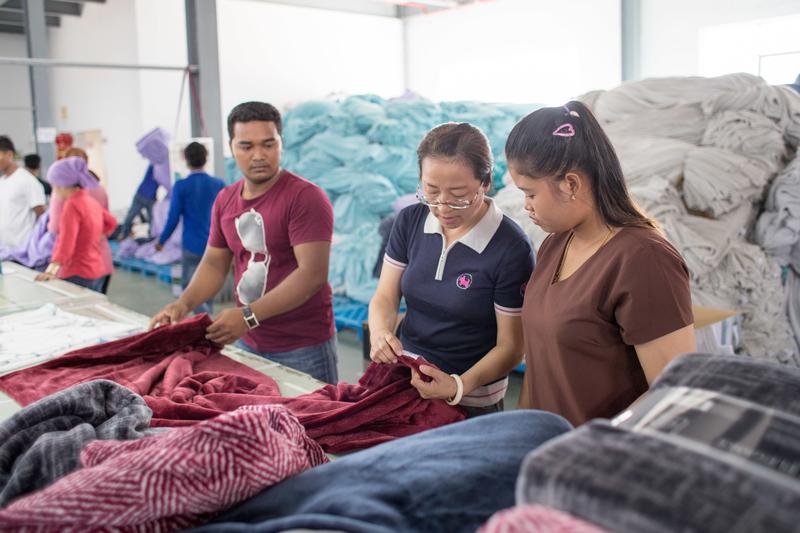ASEAN, BRICS support multilateralism, tackle global challenges together
 Employees of a Chinese textile company inspect product quality in the Sihanoukville Special Economic Zone (SSEZ) in Cambodia. The Chinese-invested SSEZ is a perfect example of win-win cooperation under the Belt and Road Initiative. (ZHU WEI / XINHUA)
Employees of a Chinese textile company inspect product quality in the Sihanoukville Special Economic Zone (SSEZ) in Cambodia. The Chinese-invested SSEZ is a perfect example of win-win cooperation under the Belt and Road Initiative. (ZHU WEI / XINHUA)
PHNOM PENH-The Belt and Road Initiative (BRI) projects have played a "monumental role" in infrastructure development and connectivity in Cambodia, said the country's Deputy Prime Minister and Foreign Minister Prak Sokhonn.
In a recent written interview with Chinese media, Sokhonn said massive infrastructure projects including roads, bridges, seaports, airports, railways, hydropower dams and communication satellites, among others, are already underway in Cambodia, and these projects are all top priorities for economic development.
The two countries have enjoyed fruitful cooperation and tangible benefits.
Prak Sokhonn, Cambodian Deputy Prime Minister and Foreign Minister
He added that there have been big projects from the cooperation between Cambodia and China under the China-proposed BRI, including the Sihanoukville Special Economic Zone, Phnom Penh-Sihanoukville expressway and the new Siem Reap international airport.
"Sihanoukville Special Economic Zone is a testament to the fruitful cooperation between the two countries under the BRI while the expressway and the airport will contribute to further boosting the economy," he said.
He said the BRI has also stimulated the promotion of cooperation in several fields such as institutional capacity building, knowledge sharing and human resources development as China provides help through scholarships, fellowships and research centers.
"More resources in innovation and green technology are needed as green development has become the key feature of BRI projects," Sokhonn said.
"With this connection, I believe that the BRI will significantly contribute to the realization of Cambodia's development goals of becoming an upper and middle-income country by 2030 and a high-income society by 2050," he added.
On Cambodia-China ties, Sokhonn said bilateral relations have stood the test of time, and with constant nurturing by leaders of the two countries in different generations, bilateral ties have been upgraded to a comprehensive strategic cooperative partnership and have kept growing from strength to strength.
"The two countries have enjoyed fruitful cooperation and tangible benefits," he said.
He added that Cambodian Prime Minister Samdech Techo Hun Sen reiterated the fact that Cambodia's development in all fields can not be detached from China's support and assistance.
"China remains Cambodia's largest trading partner and has become Cambodia's important export destination," Sokhonn said.
He said China has been Cambodia's largest source of foreign direct investment, the largest provider of development assistance and an important source of tourists.
Thanks to China's vaccine assistance, Cambodia has successfully fought the COVID-19 pandemic, he said, adding that such assistance has played a significant role in bolstering Cambodia's economic recovery amid the pandemic.
As for BRICS, the acronym for an emerging-market group that includes Brazil, Russia, India, China and South Africa, Sokhonn said that such a group has played a more important role in accelerating global socioeconomic recovery in a pandemic-ravaged era.
As the chair of the Association of Southeast Asian Nations for 2022, Cambodia hopes that ASEAN and BRICS, as well as the international community as a whole, will make more efforts to support multilateralism that prioritizes convergences in tackling regional and global challenges, particularly the pandemic as well as food and energy security, he said.
Commenting on the group's future expansion, Sokhonn said that it will enable BRICS to better represent voices of growing economies and allow the group to be more responsive to existing and emerging challenges.
It also allows developing countries to have a new platform based on the spirit of openness, mutual benefits and win-win cooperation in order to exchange views and best practices and achieve socioeconomic development, he said.


